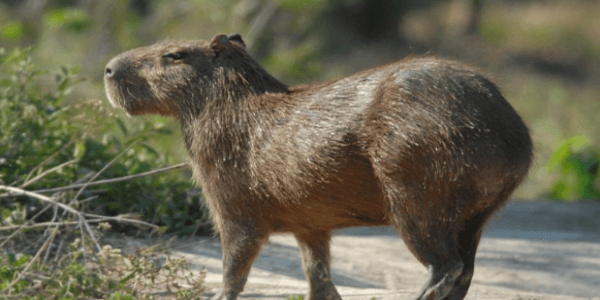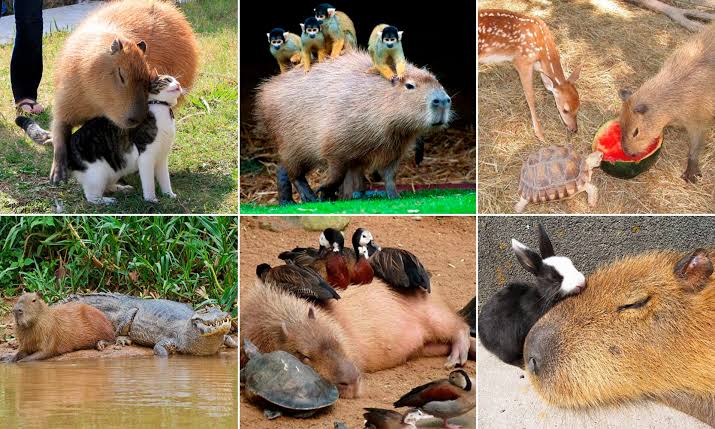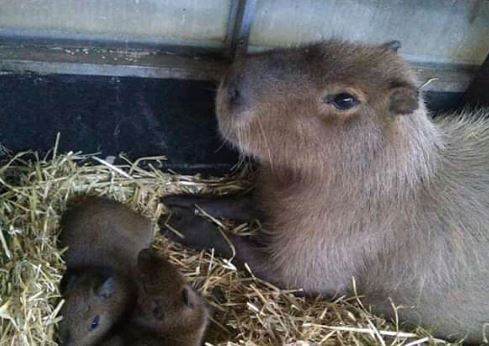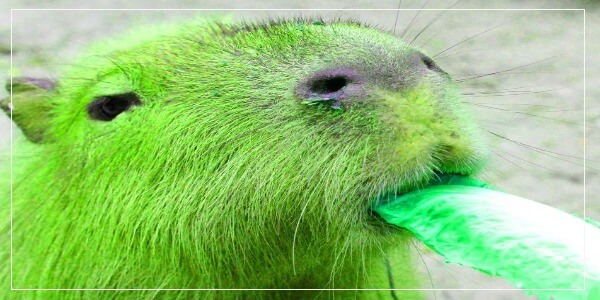Capybaras, the adorable giant rodents native to South America, have captured the hearts of many with their charming demeanor and unique characteristics. While we often marvel at their sociable nature and friendly interactions, it’s equally important to delve into their dislikes and preferences.
Understanding what capybaras do not like can provide valuable insights into their behavior, enabling us to respect their boundaries and create harmonious interactions in captive and wild settings.
What Do Capybaras Not Like?
Although capybaras are generally easygoing, there are certain things they dislike. These things often affect their well-being and make them more aggressive. Here are some of the things they disliked below.
1. Loud Noises
Capybaras respond to loud and sudden noises. They have a heightened sense of hearing; loud sounds can startle and stress them. Fireworks, thunderstorms, or even excessively noisy human activities can cause discomfort and anxiety in capybaras.
The first thing you should do once you notice capybaras are startled is to stop the loud noise. Suppose it isn’t possible to stop the noise. In that case, you can adopt other strategies, such as providing a safe space for the capybaras or erecting physical barriers to serve as noise barriers.
You can also engage them in activities and distractions to divert their attention from loud noises. This can include providing puzzles, feeders, and toys or engaging them in interactive play sessions. Keeping their minds occupied can reduce stress and anxiety associated with noise.
2. Crowded Spaces
Capybaras enjoy open spaces and dislike confinement. Social animals prefer areas where they can move freely and have ample room to graze, play, and rest. Crowded enclosures or cramped environments can stress and discomfort capybaras.
You can do different things to solve the problem of agitated capybaras due to crowded spaces. You can create a large enough space for the animal. Alternatively, create multiple hiding spots where the capybara can conceal itself if it needs solitude.
3. Aggressive Behaviors
Capybaras are generally peaceful animals and prefer to avoid confrontations or violent interactions. They dislike aggressive behaviors from humans or other animals. Aggression can lead to stress, anxiety, and potential injuries for capybaras.
To solve the problem of capybaras reacting to aggressive behavior, remove any potential triggers or stressors that may contribute to aggressive behavior. Also, respect their boundaries and provide them with space to calm down.
4. Predatory Threats
Capybaras are cautious creatures and dislike being close to potential predators. Their instincts drive them to stay vigilant and avoid situations where they feel vulnerable. Predatory threats such as large carnivores or aggressive predators can trigger stress responses in capybaras.
To solve this problem, provide capybaras with access to dense vegetation, burrows, or other suitable shelter options to hide from predators. Also, eliminate the threat if possible.
5. Water Pollution
Capybaras are semi-aquatic animals and highly dependent on water. They dislike polluted or contaminated water sources. Water pollution can negatively impact their health, affect their ability to swim and cool down, and lead to various waterborne diseases.
To solve this, implement measures to prevent water pollution at its source. You can also perform other activities such as water quality monitoring, habitat restoration to improve water quality, and more.
6. Lack of Social Interaction
Capybaras are highly social animals that thrive in the company of their herd members. They dislike being alone or separated from their companions for extended periods. Lack of social interaction can cause stress and negatively impact their mental and emotional well-being.
Integrate the capybara into an existing herd or form an existing herd with other capybaras to solve this problem.
7. Food
Although capybaras consume a variety of vegetation, they dislike some food. This food can affect them and agitate them when consumed. One such food is spicy plants. These rodents also dislike bitter plants, thorny vegetation, and more.
Simply change the food or plants available to suit its dietary needs. This will solve the problem immediately.
How Do Capybaras React to Crowded Spaces?
Capybaras, as social animals, prefer open spaces. They often show signs of discomfort or stress when confined to crowded environments. Here are some ways capybaras react to crowded spaces:
- Restlessness: Capybaras may exhibit restlessness when placed in crowded spaces. They may pace back and forth or show signs of agitation, indicating discomfort with the lack of space to move freely.
- Increased aggression: Capybaras may become more prone to aggressive behavior in crowded spaces. This can include territorial disputes, chasing, or vocalizations to establish dominance or protect their personal space.
- Avoidance Behavior: Capybaras may actively avoid crowded areas by seeking quieter or more spacious locations. They may prefer to spend their time in areas with less competition and congestion, where they can find solitude and reduce conflict.
- Elevated Stress Levels: Crowded spaces can increase Capybara stress levels. High-stress levels can negatively impact their well-being, leading to physiological and behavioral changes. These may include decreased appetite, reduced social interactions, and a compromised immune system.
Can Capybaras Be Aggressive Toward Humans?

Yes. Capybaras can be aggressive towards humans they perceive as threats, although Capybaras are generally docile and gentle animals. While they are not typically aggressive towards humans, certain situations can lead to defensive or protective behaviors.
Here are some factors to consider:
- Provocation: Capybaras display aggression if threatened or provoked. Approaching them too closely, making sudden movements, or handling them without proper trust and familiarity can make them react defensively.
- Protection of Young: Capybara mothers protect their offspring like many animal species. If a human gets too close to a capybara’s young, the mother may exhibit defensive behaviors to ensure their safety.
- Territorial Behavior: Capybaras often show territorial behavior, especially during mating season or when establishing dominance within their social groups. While this is primarily observed among capybaras themselves, humans encroaching on the territory of capybaras can trigger defensive responses.
- Stress or Distress: Capybaras who are stressed, injured, or distressed may exhibit defensive behaviors. It is critical to respect their space and provide a calm and safe environment to minimize stress and potential defensive reactions.
Do Capybaras Dislike Being Touched or Petted?
Capybaras can enjoy gentle touches and petting when familiar and comfortable with humans. However, it’s important to approach them with care and respect their boundaries. Like animals, they may have individual preferences, and some capybaras may not enjoy extensive physical contact. Observing their reactions and allowing them to initiate or refuse interaction is essential.
Some capybaras may appreciate light strokes or scratches in specific areas, such as behind the ears or along the back, while others prefer minimal contact. Establishing trust and building a positive relationship with a capybara is crucial before touching or petting them.
Do Capybaras Dislike Cold Weather?
While they can somewhat tolerate cooler temperatures, they prefer warmer climates. In colder regions, providing capybaras with suitable shelter and warmth is important. This can include insulated enclosures, heated areas, and access to blankets or hay for warmth. Capybaras may also benefit from extra food during colder months to help maintain their body heat.
Owners should closely monitor their capybaras for discomfort or distress during cold weather and take appropriate measures to ensure their well-being. While capybaras may not enjoy cold weather, proper care and attention can help them stay comfortable in chillier environments.
Conclusion
While capybaras are generally easygoing and adaptable, it is important to recognize their boundaries and respect their dislikes. For instance, capybaras are not fond of loud noises and sudden disturbances. Their tranquil nature thrives in serene environments, and they appreciate a peaceful atmosphere to unwind and bask in their surroundings.
Capybaras are not particularly fond of being handled or confined. As semi-aquatic mammals, they cherish their freedom and prefer open spaces where they can roam freely and indulge in their natural behaviors. Respecting their need for space is essential to ensure their well-being and contentment. By acknowledging and understanding what capybaras do not like, we can cultivate an environment that promotes their happiness and flourishing.


![Why Do Capybaras Not Have Tails? - [Answered] Why Do Capybaras Not Have Tails](https://capybaratips.com/wp-content/uploads/2023/03/Capy-Tail-250x200.webp)

![How Long Do Capybaras Live? - [Answered] How Long Do Capybaras Live](https://capybaratips.com/wp-content/uploads/2023/03/Capybara-Pix-250x200.webp)

![Capybara Meat And Its Culinary Uses - [Every You Should Know] Capybara Meat & Culinary Uses](https://capybaratips.com/wp-content/uploads/2023/03/Capybara-meat-250x200.webp)


